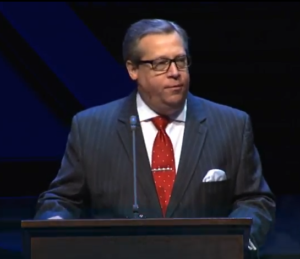A Southern Baptist seminary president said Nov. 29 that Baptists who adopt Calvinistic theology and practice ought to consider joining another denomination.
“I know there are a fair number of you who think you are a Calvinist, but understand there is a denomination which represents that view,” Paige Patterson, president of Southwestern Baptist Theological Seminary, said at the close of Tuesday’s chapel service. “It’s called Presbyterian.”
“I have great respect for them,” Patterson said. “Many of them, the vast majority of them, are brothers in Christ, and I honor their position, but if I held that position I would become a Presbyterian. I would not remain a Baptist, because the Baptist position from the time of the Anabaptists, really from the time of the New Testament, is very different.”

Rick Patrick
Patterson, co-engineer of the so-called conservative resurgence in the Southern Baptist Convention in the final two decades of the 20th century, commented immediately after chapel speaker Rick Patrick finished the morning sermon.
Patrick, executive director of Connect316 — a group formed in the summer of 2013 to counterbalance a number of new organizations promoting the New Calvinist perspective — argued that debate in the Southern Baptist Convention over Calvinism isn’t about just the single issue of how people are saved.
“Because Calvin’s Institutes address a broad spectrum of theological categories, we are actually debating much more than just the single issue of salvation,” said Patrick, senior pastor of First Baptist Church in Sylacauga, Ala. “If we are not careful a myriad of related beliefs and practices will enter our camp, hidden within the Trojan Horse of Calvinism.”
Patrick said the New Calvinism and the “traditionalist” position advocated in the past by former SBC leaders such as Herschel Hobbs and Adrian Rogers are “two competing systematic theologies” with disagreements as basic as whether the heavenly Father is a God of love.
“If God has chosen, actively or passively, before the foundation of the world to place the reprobate unconditionally into a category from which they can never possibly escape, then this is, as even Calvin admitted, a dreadful decree,” Patrick said. “I will never forget the first time a Calvinist looked me straight in the eye and said God does not love everybody. I was speechless, and frankly, that doesn’t happen much.”
Patrick said the Baptist Faith and Message endorses congregational church polity, “where decisions are pastor-led, deacon-served, committee-worked and congregation-approved.” Calvinists “are so fond of elder-led and sometimes even elder-ruled forms of polity,” he said, that one Calvinist made the claim that Congregational Government is from Satan.
“I was not so much troubled that he preferred Presbyterian polity to Southern Baptist polity, but I was troubled that he attributed to Satan a polity I believe comes from God,” Patrick said.
Patrick said Calvinists and Traditionalists differ over the question of whether man — made in the image of God – is able to freely respond to the Holy Spirit’s drawing through the preaching of the gospel.
“I say yes, but many Calvinists would say no,” Patrick said. “I agree that I am unable to save myself, but I disagree that I am unable, humbly, to make the decision to accept Jesus’ offer to save me.”
While there appears to be no direct logical connection, Patrick said “almost every observer of New Calvinism points to the surprising partnership between New Calvinism and the charismatic movement.”
There’s also a correlation, he said, between New Calvinists and post-millennialism — or at the very least John Piper’s “optimistic premillennialism,” a hybrid view drawing from various end-times theologies but furthest away from dispensationalism, a view popularized by Hal Lindsey’s The Late Great Planet Earth and Left Behind novel series by Tim LaHaye and Jerry Jenkins.
Patrick said Calvinism influences thinking on philosophy of missions and worship practices like altar calls and use of the “Sinner’s Prayer,” and on matters of private morality like drinking or smoking.
“Some New Calvinists, even pastors, very openly smoke pipes and cigars, just as they drink beer, wine,” Patrick said. “They may even home brew the beer themselves, attempting to use it as an outreach to identify with other smokers and drinkers.”
“Sin is not a form of outreach,” Patrick commented.
Patrick said some Calvinists even compromise on the bedrock of Baptist identity – believer’s baptism by immersion upon a profession of faith.
”Would you believe that some Southern Baptist churches today are receiving as members those who have merely been sprinkled but have never been immersed?” Patrick marveled. “Immersion is the only mode of baptism recognized in the Baptist Faith and Message. This creates an entire class of non-baptized Baptists, and this is prevalent especially among our Calvinistic churches, as they receive Presbyterians, for example, into their membership.”
“Southern Baptists cannot help but wonder what is happening as we increasingly embrace the Presbyterian view of salvation doctrine, church government, the mode of baptism, avoidance of the altar call, the use of beverage alcohol, the approval of societal missions funding and so on,” Patrick said.
“It is naïve to think that we can gradually reform our beliefs without simultaneously reforming our practices, and the question we must ask is whether or not these Reformed practices are making things better or worse,” he concluded.
Patterson, president of the Southern Baptist Convention seminary in Fort Worth, Texas, since 2003, is one of more than 1,100 signers of A Statement of the Traditional Southern Baptist Understanding of God’s Plan of Salvation countering the New Calvinism posted on the Connect316 website.
Differences over Calvinism run deep enough to prompt formation of a Calvinism Advisory Committee aimed at diverting partisan division in Southern Baptist life which reported in 2013.
